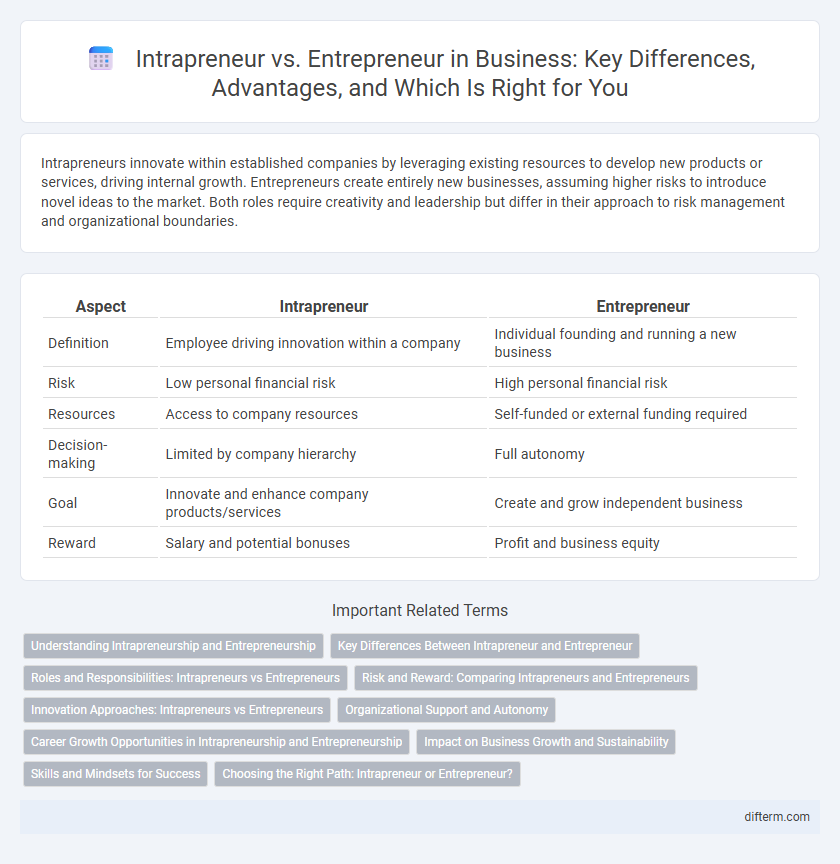Intrapreneurs innovate within established companies by leveraging existing resources to develop new products or services, driving internal growth. Entrepreneurs create entirely new businesses, assuming higher risks to introduce novel ideas to the market. Both roles require creativity and leadership but differ in their approach to risk management and organizational boundaries.
Table of Comparison
| Aspect | Intrapreneur | Entrepreneur |
|---|---|---|
| Definition | Employee driving innovation within a company | Individual founding and running a new business |
| Risk | Low personal financial risk | High personal financial risk |
| Resources | Access to company resources | Self-funded or external funding required |
| Decision-making | Limited by company hierarchy | Full autonomy |
| Goal | Innovate and enhance company products/services | Create and grow independent business |
| Reward | Salary and potential bonuses | Profit and business equity |
Understanding Intrapreneurship and Entrepreneurship
Intrapreneurship involves employees leveraging entrepreneurial skills within an existing organization to drive innovation and growth, often accessing company resources and risk mitigation. Entrepreneurship centers on individuals or teams creating new businesses independently, assuming full responsibility for risks and rewards. Understanding these roles highlights how intrapreneurs accelerate corporate development while entrepreneurs foster market disruption through new ventures.
Key Differences Between Intrapreneur and Entrepreneur
Intrapreneurs drive innovation within established organizations, leveraging existing resources and infrastructure to develop new products or services, while entrepreneurs start independent ventures, assuming full financial risk and control. Entrepreneurs focus on market disruption and scalable growth, whereas intrapreneurs prioritize aligning projects with corporate goals and sustaining competitive advantage. The key difference lies in risk ownership, with entrepreneurs bearing personal financial responsibility, unlike intrapreneurs who operate under company support and constraints.
Roles and Responsibilities: Intrapreneurs vs Entrepreneurs
Intrapreneurs drive innovation and growth within an established organization by developing new products, processes, or services while managing resources and risks aligned with corporate goals. Entrepreneurs create and lead independent ventures, assuming full responsibility for business strategy, funding, market entry, and operational execution to generate profit and scalability. Both roles require leadership, creativity, and problem-solving, but intrapreneurs operate under organizational constraints whereas entrepreneurs navigate external market uncertainties independently.
Risk and Reward: Comparing Intrapreneurs and Entrepreneurs
Intrapreneurs operate within established companies, facing lower personal financial risk due to organizational support but also sharing rewards such as salaries and bonuses rather than full ownership profits. Entrepreneurs assume high personal financial risk by investing capital and resources into startups, but they retain greater control and stand to gain substantial rewards if their ventures succeed. The risk-reward dynamic influences decision-making, where intrapreneurs prioritize innovation with stability, while entrepreneurs pursue transformative growth despite uncertainty.
Innovation Approaches: Intrapreneurs vs Entrepreneurs
Intrapreneurs drive innovation within established organizations by leveraging existing resources to develop new products or processes, fostering incremental improvements and aligning with company goals. Entrepreneurs pursue disruptive innovation independently, taking higher risks to create entirely new markets or business models with scalable potential. Both approaches fuel economic growth but differ in autonomy, risk tolerance, and strategic impact on the business ecosystem.
Organizational Support and Autonomy
Intrapreneurs benefit from organizational support such as funding, resources, and mentorship, allowing them to innovate within the company framework while maintaining job security. Entrepreneurs operate with greater autonomy, making independent decisions and assuming full responsibility for risks and rewards without the backing of an established organization. The balance between structured support and personal freedom shapes the innovative potential and strategic direction in both intrapreneurial and entrepreneurial ventures.
Career Growth Opportunities in Intrapreneurship and Entrepreneurship
Intrapreneurship offers career growth through innovation within established companies, providing access to corporate resources, mentorship, and structured advancement paths that reduce risk while fostering skill development. Entrepreneurship demands self-driven career growth by creating and scaling new ventures, offering unlimited potential but requiring resilience and adaptability amid higher uncertainty. Both paths cultivate leadership and problem-solving skills, with intrapreneurs benefiting from organizational support and entrepreneurs gaining independence and equity stakes.
Impact on Business Growth and Sustainability
Intrapreneurs drive business growth by innovating within established companies, leveraging existing resources to accelerate product development and market adaptation, which enhances long-term sustainability. Entrepreneurs, by contrast, create new ventures that introduce disruptive ideas and diversify market options, contributing to economic expansion and evolving industry landscapes. Both roles are critical for sustained business success, as intrapreneurs optimize internal growth while entrepreneurs pioneer new business ecosystems.
Skills and Mindsets for Success
Entrepreneurs thrive on innovation, risk-taking, and independent decision-making, cultivating skills such as strategic vision, resilience, and market disruption to drive business growth. Intrapreneurs excel within organizations by leveraging creativity, collaboration, and problem-solving abilities to implement new ideas while navigating corporate structures. Both require a growth mindset, adaptability, and strong leadership to transform opportunities into successful ventures.
Choosing the Right Path: Intrapreneur or Entrepreneur?
Choosing the right path between intrapreneur and entrepreneur depends on your risk tolerance, desire for autonomy, and resource availability. Intrapreneurs innovate within established organizations, leveraging company assets and support to drive new projects with lower personal financial risk. Entrepreneurs independently create and manage startups, facing higher uncertainty but gaining full control and potential financial rewards from their ventures.
intrapreneur vs entrepreneur Infographic

 difterm.com
difterm.com